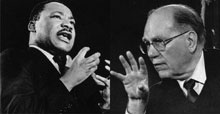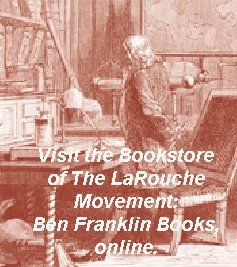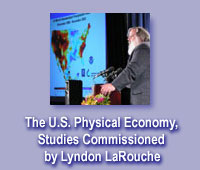|
...... ...................
|
Published: Tuesday, June 21, 2005
|
|
Volume 4, Issue Number 25
|
|
|
|
|
|
|
|
|
|
|
|
|
|
The full texts of Lyndon LaRouche's webcast speech to a town meeting of the LaRouche Political Action Committee in Washington, D.C. on June 16, 2005, and of the discussion period after LaRouche's remarks. The Democratic Party leader and economist spoke from Europe by video-conference, and the meeting in Washington was chaired by his spokeswoman, Debra Hanania Freeman.
Good afternoon, ladies and gentlemen. My name is Debra Freeman. As some of you know, I serve as Lyndon LaRouche's national spokeswoman and his representative here in Washington. And on behalf of Mr. LaRouche and the LaRouche PAC, I'd like to welcome you to this afternoon's event.
It's really hard to believe that the last time we gathered here, was just eight weeks ago. Because, indeed, the pace of events over the course of just those few weeks has been nothing short of absolutely breath-taking.
|
|
On May 23, here in the United States, in an extremely important victory for patriotic force, a bipartisan group of United States Senators delivered a very significant defeat to the Bush Administration by putting down what came to be known as the "nuclear option." The event was significant not only because it meant a defeat for the Administration, but in fact, because it was a defeat for what was nothing short of an attempted coup against the Constitution of the United States.
Just a few days later, on May 29, voters in France, in what would otherwise seem to be an unrelated event, overwhelmingly defeated the newly proposed European Constitution. In and of itself, it might have been difficult for Americans to understand that, in terms of its significance. But the French vote was perhaps more than anything else, driven by the absolute disgust by the citizens of the nation of France, with the economic disasters that they have been faced with since the adoption of the Maastricht Treaty Stability Pact, and the policy of globalization that it characterized.
The French events themselves had been foreshadowed a week earlier by a very significant election in the North Rhine-Westphalia region of Germany, where the German Social Democrats suffered a significant defeat, and a defeat that was attributed, above all else, to the failed economic policies of the Schröder government there.
...more ...pdf version
|
|
CURRENT SUBSCRIBERS:
LOG IN HERE, OR USE THE LINKS BELOW, TO ACCESS THIS ISSUE.
|
|
|
This Week in History
June 21 - 27, 1848
Congressman Abraham Lincoln Assails President Polk's Veto of Internal Improvements
On June 20, 1848, Congressman Abraham Lincoln rose from his seat in the U.S. House of Representatives and delivered a speech in favor of Federal funding for internal improvements. He was acting in response to President James K. Polk's veto of an internal improvements bill, in which the President stated that the Federal Government had no powers under the Constitution to fund such infrastructure projects as roads, canals, and railroads.
Lincoln was a member of the Whig Party, and a supporter of Henry Clay's policies of American System economics. In the 1836-37 session of the Illinois Legislature, when Lincoln was one of the delegates from Sangamon County, he had played a major role in developing the plan for infrastructural development in Illinois.
At that time, Illinois was still a developing frontier state, and a convention of Sangamon County voters had instructed their "Long Nine" delegates, so nicknamed because all of them were taller than usual, to vote "for a general system of internal improvements." Another convention of delegates from all of the state's counties met in Vandalia, then the state capital, and made a similar charge to the members of the legislature, specifying that the measures adopted should be "commensurate with the wants of the people."
Lincoln served on the Committee of Finance in the legislature, and helped steer the development plans through the legislature. Those plans included 1300 miles of railroad track to link the northern part of the state on Lake Michigan to the southern part on the Ohio River, and the Indiana border with the Mississippi. Every important river was to be widened, deepened, and made navigable, to improve the ability of farmers to transport their goods to market.
A canal was to be dug to connect the Illinois River to Lake Michigan, thus creating a waterway from the Atlantic Ocean through the St. Lawrence River and Lake Ontario to the Welland Canal, which had been completed in 1833. From Lake Erie, ships would have been able to travel through the Great Lakes and down the Illinois River to the Mississippi, and from there to the Gulf of Mexico. Since no aid was available from the Federal Government, the State of Illinois authorized the taking out of a twelve million dollar loan. Hopes were high that such a magnificent transportation network would soon bring major benefits to the rude settlements and farms of the rural areas, as well as the emerging towns. But the Panic of 1837, resulting from currency manipulation and speculation, soon plunged the nation into a severe depression and the great project had to be abandoned for a number of years.
Lincoln had told his Illinois friend Joshua Speed that he aimed at the great honor of being called the "DeWitt Clinton of Illinois," referring to the Governor of New York who had built the Erie Canal with state funds when the Federal Government refused to back it. Ten years later, Lincoln was elected as a delegate to the River and Harbor Convention in Chicago. This very well-attended meeting in July of 1847 had been called to protest President Polk's veto of a bill which would have provided federal funding for internal improvements.
Lincoln was at this point the sole Whig Congressman-elect from Illinois, and as a firm supporter of internal improvements, he was invited to address the convention. It was this speech which first gave him national coverage, when Horace Greeley in the "New York Tribune" cited Lincoln's address to the delegates, writing that this "tall specimen of an Illinoisian... spoke briefly and happily."
The Thirtieth Congress assembled in December of 1847, and Lincoln was assigned to the Committee on Post Offices and Post Roads, and to the Committee on Expenditures in the War Department. By the spring of 1848, Lincoln's talent and hard work had made him a rising force in the Whig Party. In early June, he attended the Whig National Convention in Philadelphia. After the convention nominated Zachary Taylor for President, Lincoln and three other members of the House of Representatives traveled to Wilmington, Delaware to make speeches at a ratification meeting. Lincoln was introduced as the "Lone Star of Illinois," and was loudly cheered as he predicted the coming Whig victory in November.
...more
|
|
Feature:
LAROUCHE WEBCAST
Urgent Changes Needed in World Financial System
This is Lyndon LaRouche's webcast speech to a town meeting of the LaRouche PAC in Washington, D.C. on June 16, 2005. Mr. LaRouche spoke from Europe, by video-conference. The meeting was chaired by Debra Hanania-Freeman.
Systemic Financial Crisis Creates Global Instability
by Nancy Spannaus
A swath of serious political crises, ranging from coup threats, to destabilizations, to political hysteria, is sweeping governments on all continents. This worldwide pattern is unprecedented in recent decades, noted EIR founder Lyndon LaRouche, and cannot be understood from the standpoint of the internal features of each nation. All of these crises are a reflection of the fact that the financial system is coming down, and that under those conditions, government cannot deal with the crises they are facing.
Germany Struggles for New Economic Policy
by Rainer Apel
German Chancellor Gerhard Schröder's June 13 keynote address at an economic policy congress of his Social Democratic Party (SPD) was useful, to the extent that he came out strongly in defense of the social market economy model—meaning, defense of living standards, including of the most vulnerable sectors of society—and that he announced legislation to tighten control of hedge and equity funds. The hedge funds, which are completely unregulated, are taking enormous losses on global markets, especially since May, when the debt of General Motors and Ford was downgraded to 'junk' status by Standard & Poor's.
Helga Zepp-LaRouche
Why I Must Become Germany's Chancellor
In the immediate aftermath of German Chancellor Gerhard Schröder's June 13 speech on economic policy, Helga ZeppLaRouche, the leader of the Civil Rights Movement Solidarity (Bu¨So) party in Germany, declared that she will run for Chancellor in the expected September national elections. Her full statement follows. Subheads have been added.
Conference Report
No Real Conflict of Interests Between Israel and Iran
by Mary Burdman
What emerged most clearly in discussions at an excellent seminar on a potential 'Nuclear Iran,' held at the James Shasha Institute for International Seminars at the Hebrew University in Jerusalem on May 30-June 2, is that there are no intrinsic conflicts between the real strategic and economic interests of Israel and Iran. While tensions remain high, in reality, these nations are not enemies and have never been.
Social Security Reorganization In Panama Is a 'Death Plan'
by Carlos Wesley
The government of Panamanian President Martín Torrijos rammed through a package of fascist 'reforms' of Panama's national Social Security system in a matter of just days in May, despite the overwhelming rejection of the plan by most of the population. Days of mass protests by teachers, students, doctors, tens of thousands of others in a general strike, and violent clashes with the police which caused scores of injuries and led to many arrests, were to no avail in stopping the Torrijos-controlled National Legislative Assembly from voting in favor of, among other things, raising the retirement age, increasing the number of monthly installments a person must pay to qualify for Social Security benefits, and handing over a chunk of the system's financial resources to private banks.
Interview: Eduardo Ríos
The Banks Will Make Billions from This
Mr. Ríos is a Panamanian lawyer, author, and former trade union leader. He was one of the signers of the founding declaration of the Schiller Institute, and a founding member of the Schiller Institute Trade Union Commission. Although the Commission is no longer in existence, the Schiller Institute remains active. Carlos Wesley interviewed Ríos on June 6. The discussion has been translated from Spanish.
National:
Franklin Indictment: Bigger Than the Pollard Affair
by Jeffrey Steinberg
On June 13, a 20-page grand jury indictment—dated May 26—against Pentagon analyst Lawrence Franklin, was unsealed in Federal Court in Alexandria, Va., opening a new page in a several-year-long espionage probe that now promises to blow more circuits than the 1985 Jonathan Pollard arrest and espionage conviction.
Huntington's Synarchist Scenario Escalates on U.S.-Mexican Border
by William F. Wertz, Jr. and Benjamín Castro
With the dismantling of the industrial capacity and skilled labor force in the United States, and the destruction of the Mexican economy by the free-trade policies of the collapsing global Anglo-Dutch monetary system, a pressure cooker has been building up steam on both sides of the U.S.-Mexican border. The number of people trying to cross the border, as economic refugees, is overwhelming the Border Patrol, and the self-appointed Minutemen vigilantes on the U.S. side are increasing in influence and number, having been welcomed by California Governator Arnold Schwarzenegger.
Portsmouth Closure Would End 300 Years of Shipbuilding
by Marsha Freeman
Without a decisive naval force we can do nothing definitive, and with it, everything honorable and glorious. —President George Washington to the Marquis de Lafayette, Nov. 15, 1781
Closing the Portsmouth Naval Shipyard not only will have a devastating economic impact on the region, but will diminish the military's engineering and nuclear capabilities, and bring to an end a 300-year history of innovative shipbuilding.
- Documentation
Maine Passes Resolution Rejecting Base Closings
Joint Resolution Memorializing the Congress of the United States To Mandate that the Base Realignment and Closure Commission Reject the Department of Defense's Recommendation To Realign Naval Air Station Brunswick and To Close Portsmouth Naval Shipyard and the Defense Finance and Accounting Service in Limestone
City Councils Say: Save Auto Industry!
On June 14, the City Council of Buffalo, N.Y., became the third City Council, and the fourth local legislative body, to pass a resolution demanding that the U.S. Congress take emergency action to save the nation's automotive industry. These actions by local governmental bodies reflect a growing politicization of the population of the U.S. Midwest, often known as the 'rust belt,' in the face of the ongoing dramatic collapse of General Motors and Ford, toward outright bankruptcy.
Science and Technology:
How To Build 6,000 Nuclear Plants by 2050
We asked nuclear engineer James Muckerheide how many nuclear plants would be needed to bring the world's population up to a decent standard of living, and how to do it. Here are his answers.
DISCUSSION ON SCIENCE WITH HELGA
Man's Original Creations
by Lyndon H. LaRouche, Jr.
June 6, 2005
Recently, my wife, Helga Zepp-LaRouche, reminded me, that Cardinal Nicholas of Cusa had emphasized that man's discovery of universal physical principles changed the universe in the sense of generating newly created agencies. It should be noted that Helga's continuing studies of the work of Cusa, which have been continued, with varying intensity, during approximately three decades, were begun during the mid-1970s, and were begun, with my emphatic encouragement, in frequent consultation with Professor Haubst of the Cusanus Gesellschaft, then the world's leading expert on Cusa.
|
|
|

EIR DVD
LaRouche: `The Immortality of Martin Luther King'
Lyndon H. LaRouche, Jr.
speaks to the Martin Luther King Day Prayer Breakfast in Talladega County, Alabama on Jan. 19, 2004
$25
Order Online
or call 1-888-EIR-3258 (toll-free)
|
|
|
|
|
|
|
|
Do you wish to change your account information?
 |
"Our Purpose is to organize people to contribute, intellectually and otherwise, to the organizing of a mass-based movement—a Gideon's Army, but with mass-base potential and actual support—to mobilize the members of Gideon's Army to study, to read, to think, to consult together, to organize together, to try to reach out and influence broader and broader layers of the population."
—Lyndon H. LaRouche, Jr. |
|
|
All rights reserved © 2005 EIRNS
|
Subscribe to EIR Online
For all questions regarding your subscription to EIW, or questions or comments regarding the EIW website's contents or design, please contact eironline@larouchepub.com.
Phone: 1-888-EIR-3258
|
|
|



